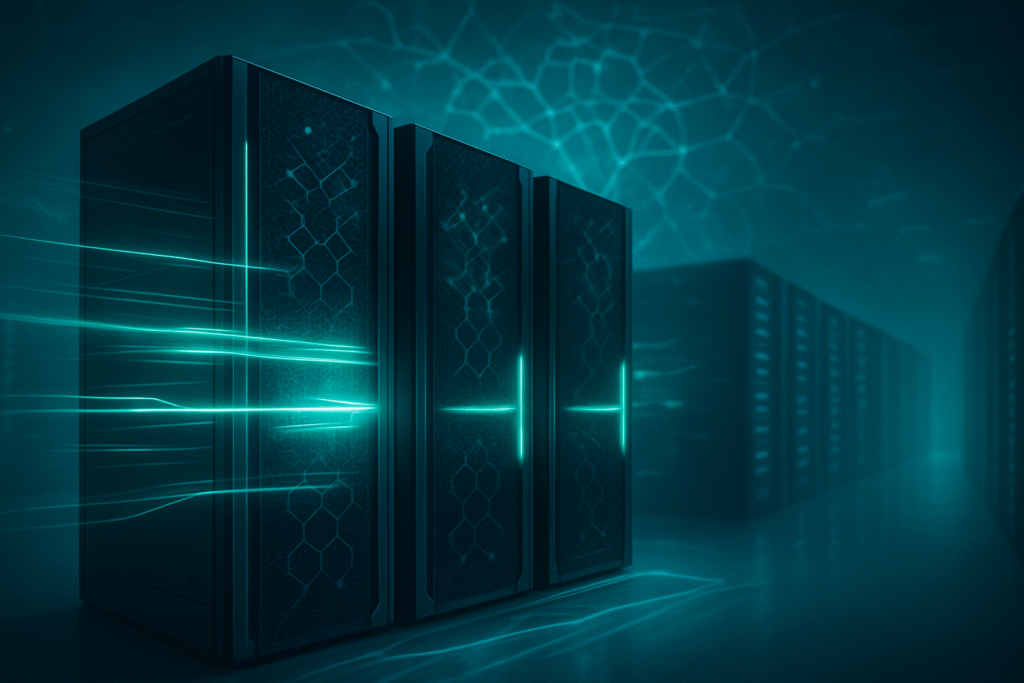
ROUND ROCK, TX – October 7, 2025 – Dell Technologies (NYSE: DELL) today announced a significant upward revision of its long-term financial growth targets, a move primarily driven by what the company describes as "insatiable demand" for its AI servers. This bold declaration underscores Dell's pivotal role in powering the burgeoning artificial intelligence revolution and signals a profound shift in the technology landscape, with hardware providers becoming central to the AI ecosystem. The announcement sent positive ripples through the market, affirming Dell's strategic positioning as a key infrastructure provider for the compute-intensive demands of generative AI.
The revised forecasts are ambitious, projecting an annual revenue growth of 7% to 9% through fiscal year 2030, a substantial leap from the previous 3% to 4%. Furthermore, Dell anticipates an annual adjusted earnings per share (EPS) growth of at least 15%, nearly double its prior estimate. The Infrastructure Solutions Group (ISG), which encompasses servers and storage, is expected to see even more dramatic growth, with a compounded annual revenue growth of 11% to 14%. Perhaps most telling, the company raised its annual AI server shipment forecast to a staggering $20 billion for fiscal 2026, solidifying its commitment to capitalizing on the AI boom.
Powering the AI Revolution: Dell's Technical Edge in Server Infrastructure
Dell's confidence stems from its robust portfolio of AI-optimized servers, designed to meet the rigorous demands of large language models (LLMs) and complex AI workloads. These servers are engineered to integrate seamlessly with cutting-edge accelerators from NVIDIA (NASDAQ: NVDA), AMD (NASDAQ: AMD), and other leading chipmakers, providing the raw computational power necessary for both AI training and inference. Key offerings often include configurations featuring multiple high-performance GPUs, vast amounts of high-bandwidth memory (HBM), and high-speed interconnects like NVIDIA NVLink or InfiniBand, crucial for scaling AI operations across multiple nodes.
What sets Dell's approach apart is its emphasis on end-to-end solutions. Beyond just the servers, Dell provides comprehensive data center infrastructure, including high-performance storage, networking, and cooling solutions, all optimized for AI workloads. This holistic strategy contrasts with more fragmented approaches, offering customers a single vendor for integrated AI infrastructure. The company’s PowerEdge servers, particularly those tailored for AI, are designed for scalability, manageability, and efficiency, addressing the complex power and cooling requirements that often accompany GPU-dense deployments. Initial reactions from the AI research community and industry experts have been largely positive, with many acknowledging Dell's established enterprise relationships and its ability to deliver integrated, reliable solutions at scale, which is critical for large-scale AI deployments.
Competitive Dynamics and Strategic Positioning in the AI Hardware Market
Dell's aggressive growth targets and strong AI server demand have significant implications for the broader AI hardware market and competitive landscape. Companies like NVIDIA, the dominant supplier of AI GPUs, stand to benefit immensely from Dell's increased server shipments, as Dell's systems are heavily reliant on their accelerators. Similarly, other component suppliers, including memory manufacturers and networking hardware providers, will likely see increased demand.
In the competitive arena, Dell's strong showing positions it as a formidable player against rivals like Hewlett Packard Enterprise (NYSE: HPE), Lenovo, and Super Micro Computer (NASDAQ: SMCI), all of whom are vying for a slice of the lucrative AI server market. Dell's established global supply chain, extensive service network, and deep relationships with enterprise customers provide a significant strategic advantage, enabling it to deliver complex AI infrastructure solutions worldwide. This development could intensify competition, potentially leading to further innovation and pricing pressures in the AI hardware sector, but Dell's comprehensive offerings and market penetration give it a strong foothold. For tech giants and startups alike, Dell's ability to quickly scale and deploy AI-ready infrastructure is a critical enabler for their own AI initiatives, reducing time-to-market for new AI products and services.
The Broader Significance: Fueling the Generative AI Era
Dell's announcement is more than just a financial forecast; it's a barometer for the broader AI landscape, signaling the profound and accelerating impact of generative AI. CEO Michael Dell aptly described the AI boom as "the biggest tech cycle since the internet," a sentiment echoed across the industry. This demand for AI servers underscores a fundamental shift where AI is moving beyond research labs into mainstream enterprise applications, requiring massive computational resources for both training and, increasingly, inference at the edge and in data centers.
The implications are far-reaching. The need for specialized AI hardware is driving innovation across the semiconductor industry, data center design, and power management. While the current focus is on training large models, the next wave of demand is anticipated to come from AI inference, as organizations deploy these models for real-world applications. Potential concerns revolve around the environmental impact of energy-intensive AI data centers and the supply chain challenges in meeting unprecedented demand for advanced chips. Nevertheless, Dell's announcement solidifies the notion that AI is not a fleeting trend but a foundational technology reshaping industries, akin to the internet's transformative power in the late 20th century.
Future Developments and the Road Ahead
Looking ahead, the demand for AI servers is expected to continue its upward trajectory, fueled by the increasing sophistication of AI models and their wider adoption across diverse sectors. Near-term developments will likely focus on optimizing server architectures for greater energy efficiency and integrating next-generation accelerators that offer even higher performance per watt. We can also expect further advancements in liquid cooling technologies and modular data center designs to accommodate the extreme power densities of AI clusters.
Longer-term, the focus will shift towards more democratized AI infrastructure, with potential applications ranging from hyper-personalized customer experiences and advanced scientific research to autonomous systems and smart cities. Challenges that need to be addressed include the ongoing scarcity of advanced AI chips, the development of robust software stacks that can fully leverage the hardware capabilities, and ensuring the ethical deployment of powerful AI systems. Experts predict a continued arms race in AI hardware, with significant investments in R&D to push the boundaries of computational power, making specialized AI infrastructure a cornerstone of technological progress for the foreseeable future.
A New Era of AI Infrastructure: Dell's Defining Moment
Dell's decision to significantly raise its growth targets, underpinned by the surging demand for its AI servers, marks a defining moment in the company's history and for the AI industry as a whole. It unequivocally demonstrates that the AI revolution, particularly the generative AI wave, is not just about algorithms and software; it's fundamentally about the underlying hardware infrastructure that brings these intelligent systems to life. Dell's comprehensive offerings, from high-performance servers to integrated data center solutions, position it as a critical enabler of this transformation.
The key takeaway is clear: the era of AI-first computing is here, and the demand for specialized, powerful, and scalable hardware is paramount. Dell's bullish outlook suggests that despite potential margin pressures and supply chain complexities, the long-term opportunity in powering AI is immense. As we move forward, the performance, efficiency, and availability of AI infrastructure will dictate the pace of AI innovation and adoption. What to watch for in the coming weeks and months includes how Dell navigates these supply chain dynamics, the evolution of its AI server portfolio with new chip architectures, and the competitive responses from other hardware vendors in this rapidly expanding market.
This content is intended for informational purposes only and represents analysis of current AI developments.
TokenRing AI delivers enterprise-grade solutions for multi-agent AI workflow orchestration, AI-powered development tools, and seamless remote collaboration platforms.
For more information, visit https://www.tokenring.ai/.






